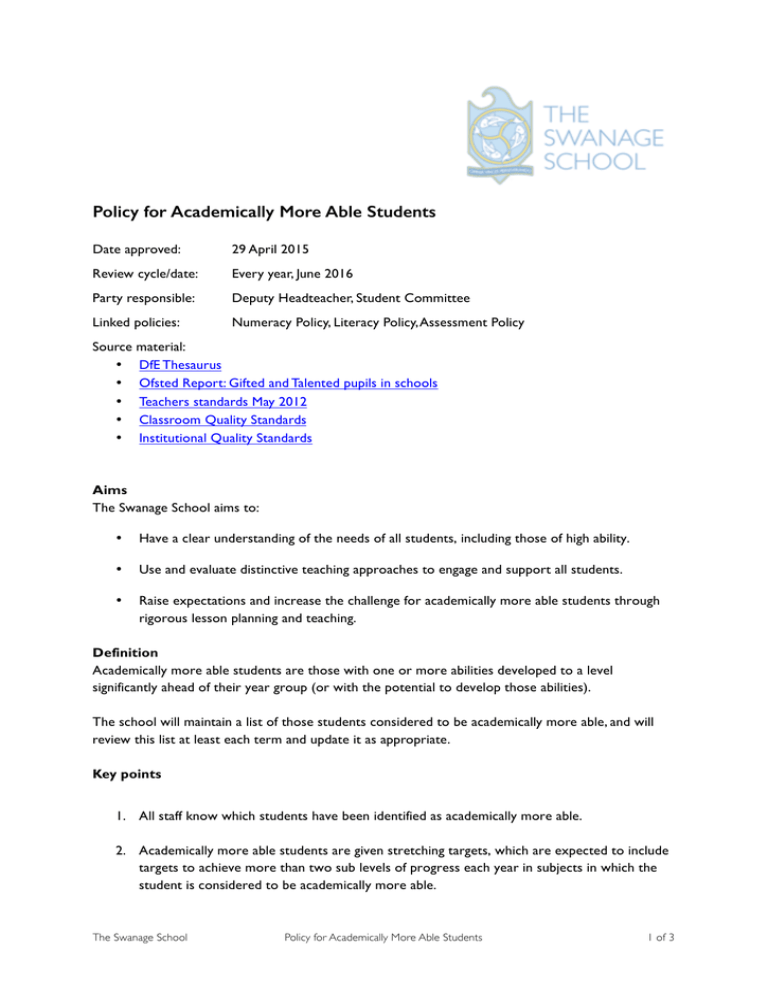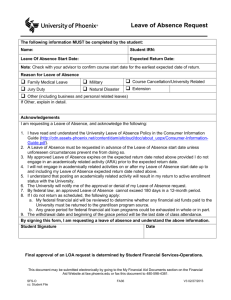Policy for Academically More Able Students
advertisement

Policy for Academically More Able Students Date approved: 29 April 2015 Review cycle/date: Every year, June 2016 Party responsible: Deputy Headteacher, Student Committee Linked policies: Numeracy Policy, Literacy Policy, Assessment Policy Source material: • DfE Thesaurus • Ofsted Report: Gifted and Talented pupils in schools • Teachers standards May 2012 • Classroom Quality Standards • Institutional Quality Standards Aims The Swanage School aims to: • Have a clear understanding of the needs of all students, including those of high ability. • Use and evaluate distinctive teaching approaches to engage and support all students. • Raise expectations and increase the challenge for academically more able students through rigorous lesson planning and teaching. Definition Academically more able students are those with one or more abilities developed to a level significantly ahead of their year group (or with the potential to develop those abilities). The school will maintain a list of those students considered to be academically more able, and will review this list at least each term and update it as appropriate. Key points 1. All staff know which students have been identified as academically more able. 2. Academically more able students are given stretching targets, which are expected to include targets to achieve more than two sub levels of progress each year in subjects in which the student is considered to be academically more able. The Swanage School Policy for Academically More Able Students 1 of 3 3. Students are given appropriately differentiated work in lessons and as out of class learning. For example, where such work includes research, the students will be asked to use the information gained by such research to solve problems or demonstrate their high-level thinking skills in reasoned responses. 4. Additional learning opportunities are provided to allow students to develop in areas where they have been identified as more academically able. These opportunities are monitored for effectiveness and (where appropriate) for links with the rest of the curriculum. For example these may include external visits, visits to the school from external experts, twilight sessions for additional GCSE subjects, and entry into relevant competitions. Such provision is not limited to academically more able students, but all students choosing to participate should be prepared for a challenging pace of learning. 5. If an academically more able student is at risk of not achieving their potential, a programme of intervention will be put in place. This is student-specific but can include: working with parents; mentoring; coaching; additional study support; leadership opportunities, with the aim of developing self-belief and learning resilience - to stimulate a ‘can-do’ approach to learning to a ‘will do’ confidence. 6. A ‘bank of work’ will be created and stored on the virtual learning environment. It will be refreshed regularly. This will involve models of ‘outstanding’ work from all subjects by students and will be a way of presenting achievements and showing other students what they can do to achieve higher standards of work. Planning and assessment a) Planning Lessons will be planned so that work is matched to the needs of individuals and groups in order to ensure effective learning with the right balance of challenge and accountability for all students: Plans will include: • opportunities for investigative tasks which can extend the more able; • clear objectives and learning outcomes for students of all abilities; • differentiated learning activities. The National Quality Standards are used for: • auditing and evaluating provision for teaching and learning; • reviewing and extending the curriculum; • supporting pupils in the most effective ways outside school; • setting targets and tracking progress, matched carefully to need; • showing the interventions available for different groups of pupils; • showing how parents might be involved. b) Assessment: The Swanage School’s rigorous procedures for assessment, monitoring and tracking will be used to • inform planning, provide students with good feedback and inform teaching and facilitate learning; The Swanage School Policy for Academically More Able Students 2 of 3 • provide data to enable student progress and determine the requirements for studentspecific intervention; • inform target setting. Arrangements for monitoring and evaluation The effectiveness of the policy for academically more able students will be monitored, evaluated and reviewed both day to day and more strategically: 1. Ongoing monitoring: • Informal feedback from students; • Lesson observations; • Sampling of students’ work; • Discussions between members of staff; • Feedback from parents; • Student progress in lessons. 2. Strategic monitoring and evaluation: • Schemes of Work are reviewed at the end of the period of study, or annually as appropriate; • Analysis of student summative assessment data, termly; • Written and verbal feedback from students, annually; • Review of The School and Departmental Development Plans, annually. The Governing Body will review the policy for academically more able students every year and assess its implementation and effectiveness. The Swanage School Policy for Academically More Able Students 3 of 3
